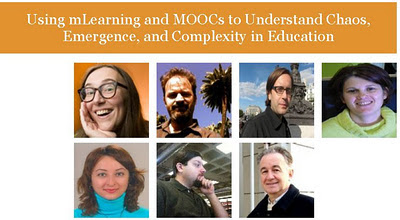
Although a propagator of learning with mobile devices, in this seminar
John Traxler takes a look at learning with mobile devices from another angle, a critical one while looking for answers from all of us. He moves away from the main trend of depicting mLearning as successful simply because it brings education to people that did not use technology for education before and of the main narrative that mLearning is a sure benefit.
This is a description of a seminar given by John Traxler at the
London Knowledge Lab (London, UK): “Too many elephants in the room: learning with mobile devices in developing regions" on 8 November 2011. It is how my mind interpreted the talk, so I could have misinterpreted some ideas, or put the wrong emphasis on some points. Open for remarks.
John Traxler lives and breathes mobility. His expertise on learning with mobile devices is well known internationally and as he advizes, supports and plans mLearning projects, his air/land/water mileage must be well that of any average global citizen adding to his mobile persona. He is at the crossroads of different views/accounts (government, practitioners, researchers, users…) on learning with mobile devices which makes his critical views on the subject of interest for mLearning practitioner (well, from my point of view that is).
During his seminar, John raised two major questions: - Are learning projects based on mobile devices really helping Africa forward?
- How can we move ahead getting all the major, willing stakeholders around an ethical educational project development table?
Are learning projects based on mobile devices really helping Africa forward? John starts of the seminar with putting question marks on widely promoted mLearning projects like Nokia Maths project.
Potential of mobiles and learning specifically in Africa, is it really a fact and do these projects make a difference? Various stakeholders barking up the wrong trees. Looking back on the presentations of the past (both his own and those of other mLearners). He takes away the ‘magic’ on the combination of mobiles, learning and Africa.
It is a fact that at the moment there are no reasonable alternatives (no secure buildings for computes, no reliable connectivity/electricity…), so mobiles seem to be successful for education.
Why address this concept: the zeitgeist, as US funders start to move into mobiles in Africa, pushed on their school system, prices for projects (UNESCO and US, GSMA took onboard mobiles for learning, …) the idea behind it is that mLearning in Africa is a big market. So education might just be an excuse to dig into that market via a more human need, which is actually nothing more or less than a mask. But simply wanting to get into a market, does not assure that the projects to get into the market have a sound educational basis.
(
reflection of myself: what makes up successful education initiatives? Is there some kind of 'ideal factors' template that can be derived of local and national projects that are set-up around the world or even just in small regions? The schools from the industrial age delivered for industrial needs, but which system or projects can deliver learners for the knowledge age? I would think knowledge driven schools and/or projects, but then where resides knowledge?)
So can we build scaled, durable mLearning projects? Many African representatives are willing to move into mLearning. But what are they buying into? Is it real progress? Momentarily it seems a bit naïve belief. So it seems corporates sell mLearning as the only development way to go, but is it? Belief in technology, and thinking that the Western model will move Africa forward (as well) might not be the best basis to move ahead in a continent that has many challenges to tackle.
Globally education seems to be heading the same way, but that is mainly a Western way of thinking and does this model work across the globe, does this model work in the West? (
reflection of myself: good point.).
Most projects in Africa were/are small scale, short term. If these projects get adopted on a bigger scale, problems might arise.
Trojan horse: technology brought into Africa can be importing Western ideology into the African setting. But these technologies are embodying alien pedagogies that might not link to African learning (e.g. VLE). So Northern technologies might embody morals, ideas from the North.
Every region has different pedagogies, but not all learning technologies have been adapted to these pedagogies.
Connecting small, vulnerable cultures to the global might be disastrous for their culture (UNESCO indicates that from the 400 African languages, 200 are under thread of extinction).
The onward march of American English and corporate thinking threaten many of the identities (Stephen Fry on language and identity – Inge check youtube options, should come from mid October).
(
reflection of myself: looking at this question from a pragmatic viewpoint and thinking about the book Guns, Germs and Steel written by Diamond, one could wonder if small projects or ethical considerations need to be taken into account, for up until now it seems to be that only the big powers have prevailed throughout history, no matter where they were located. Not a comforting thought, but maybe it is romantic to think that the diversity of the small, local groups will add to the survival of humanity in the end? - having written this, I do feel that diversity is our only hope, but then why does it seem to be cast aside when looking at history?)Common denominator of projects that have small scale, fixed term, run by enthusiasts but they have not sustained. In part that might have been the mindset around problem solving that pays a lot of attention to the artifact and not much attention to the environment and the host. There are a lot of reasons why this happens: what gets funded is the project, not the host. Additionally, the funders have funded what THEY thought was worthwhile, not what the grassroots target audience found useful. The mLearning projects have not worked enough with local populations (cultures, contexts…).
Is there a solution for this? And can that solution be found by getting stakeholders together but with some ethical ideas behind it?How can we move ahead getting all the major, willing stakeholders around an ethical educational project development table? (from here a search for connections between sometimes opposite views)
Many of us mLearner’s take our small pilots to bigger institutes/bodies, which they pick up for bigger projects, but this has those challenges in it.
How can researchers influence big scale projects supported by government that work top-down (in contrast to small scale projects which are grassroots)? So how can we get our voices (as researchers) heard and with what type of evidence? And does this allow regional learners’ voices to be heard as well?
Interesting view: the causal relationships of mLearning projects is viewed according to that persons own frame: a technologist will view positive/negative results of a mLearning project as due to technology; a policymaker will find it was/is due to policy. How can we make sure all of these views match the ultimate goal: educational benefit for learners?
As you are your own group/culture, you make and live by your own rules. These rules come from cultural motivation, culture group narratives… so who are the others to judge on it?
There is never a narrative of a failed mLearning project. Looking at the amount of projects, that is impossible. There is a momentum of mLearning successes, but are they truthful? Do they deliver complete pictures? And if the evaluation is not transparent, then how do we know if the results that we derive from them are the correct interpretations?
So how do we connect the dots if the complete picture is not (well) documented?
Additionally, a uniform hardware platform is delivered to mLearning projects in many cases. But we will never be in a position to give everyone those same devices (let alone while keeping in touch with the evolution of devices by the time we can reach big groups).
There have been successful projects in non-educational fields: phone banking for example. But these projects are not perse transmutable to educational projects. So why do we fail to deliver educational mLearning successes.
John asks us how can we bring together a combination of corporate, government, grassroots to deliver education in sub-Saharan Africa? To come to a sustainable mobile learning ecology? Without delivering globalized content? So how can we keep it indigenous and local although we bring big groups together. What is the role of local people/citizens that would allow sustainability: community teachers, free schools…
What does it take to make mLearning projects/educational projects economically sustainable? Social entrepreneurs (remarked that Bill Gates asked the audience what was meant by social entrepreneurs in 2009, Doha – ict4d), they might make a difference. How to make it a way forward on many levels: education and economy.
M4D has an impoverished idea of education: ‘pushing stuff down tubes’.
Misses out on education to be transformative (
remark Inge: but then how many projects in the North have given rise to transformative education?)
Mobiles have the potential to gives all of us more insight in how we learn: potential for transient knowledge for example, we should use this new meta-analysis tool to develop future educational projects (
remark myself: transformation of education has impact on the whole of society and its production logic, should make a post series from this, then link it to future of education and society as a whole).
Some examples he gives along his talk:Digital doorway (cfr Mitra’s whole on the wall, but African example)
Meraka supports
livinglabs in South-Africa: they come from science and technology way of doing things, but they (from government) need to build social useful programs/applications.
 To all of us who think education is stressed for change, this paper on using mLearning and MOOCs to understand chaos, emergence, and complexity in education is a collaborative effort to embrace chaos in new educational formats (MOOC, mLearning) to come to a new educational balance... in the end.
To all of us who think education is stressed for change, this paper on using mLearning and MOOCs to understand chaos, emergence, and complexity in education is a collaborative effort to embrace chaos in new educational formats (MOOC, mLearning) to come to a new educational balance... in the end.




